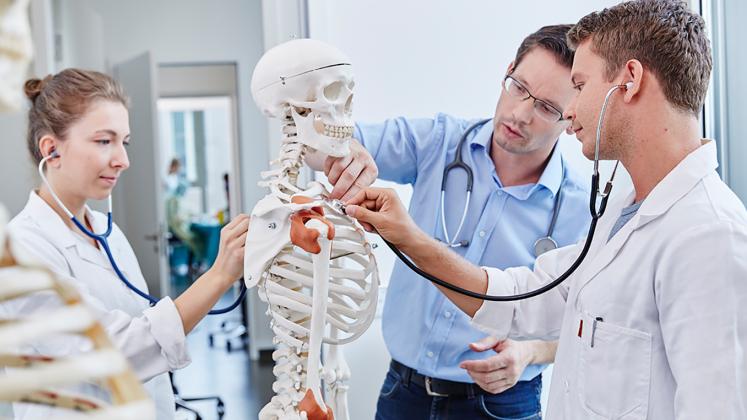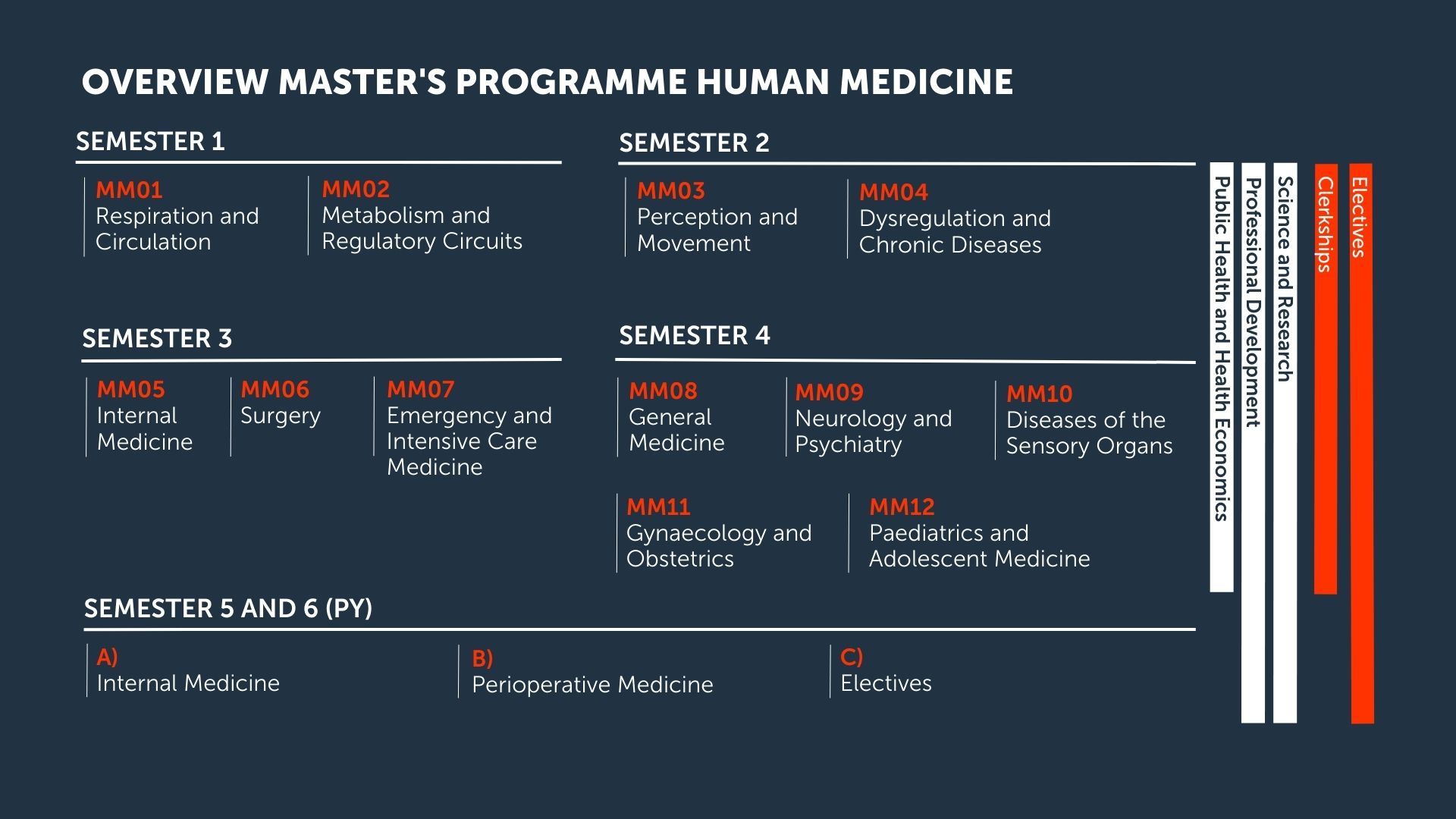
Curriculum
The Master's programme in Human Medicine is the second part of medical studies in line with the Bologna model and builds upon the curriculum of the Bachelor’s degree in Medical Science. It is also divided into modules. It provides scientific preparatory training for the medical profession and imparts the skills needed for a career in medicine. In the first four semesters, students take part in a large number of bedside teaching sessions in very small groups at the university hospitals. The third year of the course is designed as a practical year (PY).

Content of the Master’s degree in Human Medicine
Respiration and Circulation
The introduction to this field takes an interdisciplinary approach, including references to what students have already learned. The aim is to reinforce the basics of the cardiovascular system and the respiratory tract. In bedside teaching sessions and case study seminars, students engage with diseases of the cardiovascular system and respiratory tract with cross-disciplinary relevance. A seminar on electrocardiography and emergencies rounds off the module.
Metabolism and Regulatory Circuits
This module looks at the digestion and metabolism of food and liquids, adaptive immune response to infectious agents, and electrolyte balance. It covers the basics of nutrition, the causes and consequences of nutritional disorders, and potential treatments. Other key topics in this module include the homeostatic principles of metabolism, endocrinology and nephrology.
Perception and Movement
This module provides a refresher on neurophysiology and sensory physiology and introduces students to clinically relevant symptoms and syndromes the fields of dermatology, ophthalmology and ear, nose and throat medicine, looking at common clinical pictures. It deals with the pathological root causes of neurological symptoms and syndromes, along with pathological processes of the musculoskeletal system. On the practical side, students learn to describe the condition of the patient at initial observation in a specific and focused way.
Dysregulation and Chronic Diseases
Aspects of dysregulation are addressed from a wide variety of perspectives (diseases of civilisation like diabetes mellitus, plus specific endocrine diseases, connective tissue diseases/rheumatic conditions and chronic kidney diseases). The focus on cultural and social factors leads on to the discussion of pertinent issues in terms of the human life cycle and within the context of ageing processes. The module looks at malignant and chronically progressive diseases and how we deal with limitations and death. Finally, it provides insights into laboratory diagnostics and imaging for chronic diseases.
Internal Medicine and Surgery
These two modules focus on producing clinical findings, diagnosis and differential diagnosis, current treatment concepts for internal medicine diseases from the fields of gastroenterology, cardiology, pneumology and oncology, and all of the sub-specialities of surgery. Diseases are covered in terms of clinical appearance, imaging or endoscopic diagnostics, therapy and follow-up treatment. Students are shown and learn examination techniques and surgical skills. Seminars on clinical oral medicine and transplantation medicine round out these modules.
Emergency and Intensive Care Medicine
Students deepen their knowledge of methodology, monitoring and management in the operating theatre, in monitoring units and intensive care units. They develop manual skills for emergency and intensive care medicine and learn about pain therapy, ethical aspects and the possibilities for early rehabilitation of patients in emergency and intensive care.
General Medicine
Teaching on primary care focuses on typical diagnoses and problems, giving advice and care practice set-ups. Students also learn about initial treatment in interdisciplinary accident and emergency departments, including initial diagnostics and triage.
Neurology and Psychiatry
Establishing the patient’s medical history, conducting neurological examinations and interpreting the examination results lead on to neurological and neurosurgical diagnosis or differential diagnosis and treatment plans. The course goes over the basics of clinical pictures in child and adolescent psychiatry and in adulthood, while expanding knowledge of specific psychiatric disorders.
Diseases of the sensory organs
Students are taught how to diagnose and treat disease groups from the fields of skin and venereal diseases, ophthalmology and ENT.
Gynaecology and Obstetrics / Paediatrics and Adolescent Medicine
Students apply their foundational knowledge, understanding and clinical skills in the fields of gynaecology, obstetrics, neonatology, paediatrics and adolescent medicine by conducting tasks such as taking a gynaecological and paediatric anamnesis, including obtaining an anamnesis from others (medical history discussion with parents/legal guardians) and ascertaining gynaecological or and paediatric condition at the time of admission. Diagnostic and therapeutic methods are also taught through involvement in routine operations.
The aim of the fifth and sixth semesters (in the practical year (PY)) is to consolidate students’ existing knowledge, skills, abilities and professional conduct in the medical environment. The PY lasts 48 weeks and begins in August. It is divided into three elements (tertials): Internal Medicine, Perioperative Medicine and an elective subject. These training elements can be completed in a hospital department, clinical institute, outpatient clinic or teaching practice. The main focus is on providing supervised care to patients. In the final week of each term at KL, students undertake a review of what they have learnt and sit examinations.
This series of courses builds on the content of the Public Health and Economics line from the Bachelor’s degree in Medical Science and gives students an overview of public health experts’ other areas of competence. The focus here is on building intellectual and practical skills for making policy decisions in the healthcare sector as well as managing and organising healthcare facilities. In particular, these should hone the personal skills of those working in the roles of leader/manager or health advocate. Graduates acquire an overview how the Austrian and international healthcare systems operate, the interest groups involved and how the healthcare sector operates as a market. They develop the ability to identify and examine the potential of supply structure planning.
The Professional Development line builds seamlessly upon the Professional Development and Skills line in the Bachelor’s degree in Medical Science. These courses teach competencies that are indispensable in medical practice. The content is divided into the areas of (self-) organisation and digital medicine, doctor/patient communication, working in a team, professionalism, medical ethics and law, and clinical skills, which crop up in all semesters of the course. The taught sessions take the form of seminars or practical training, with instructors from the individual subject areas helping students improve their competencies over the course of the programme. In addition to assessments as part of the course, students produce ongoing review reports, which are examined by the line instructors in a summative evaluation.
The Science and Research line enhances and hones the individual competence of scholars for research-led learning. These courses promote scientific thinking and working, and run alongside the students’ work on their study protocol and the thesis itself right up until they defend their thesis. Although the language of instruction for the Master’s degree is German, the Master’s thesis should be written in English, as this is the predominant scientific language in medicine. This line therefore includes a course in scientific English. Current scientific publications are presented and critically discussed in a ‘journal club’.
The compulsory clerkships are worth 16 ECTS and equate to 16 weeks over the entire Medical Studies. Students can begin their clerkships after completing the preparatory course and passing the clerkship exam (in form of an OSCE) at the end of the second academic year of the Bachelor's programme Medical Science.
Students must earn at least 8 ECTS (equivalent to 8 weeks of clerkships) to successfully complete the Bachelor's programme Medical Science. All clerkships (16 ECTS) must be completed before beginning the third year of the Master's programme Human Medicine (practical year).
Compulsory elective subjects deepen knowledge in a sub-area of a specific medical and/or scientific discipline, or in an ability or skill. Students select compulsory elective subjects based on an area of interest in which they would like to extend their knowledge. Special compulsory electives can also be prescribed to extend knowledge in the subject of a student’s Master’s thesis.
Optional (compulsory) subjects completed at other postgraduate educational institutions can also be credited if they amount to at least 0.5 ECTS. Elective subjects worth at least 3.0 ECTS must be completed as part of the Master’s degree in Human Medicine.

